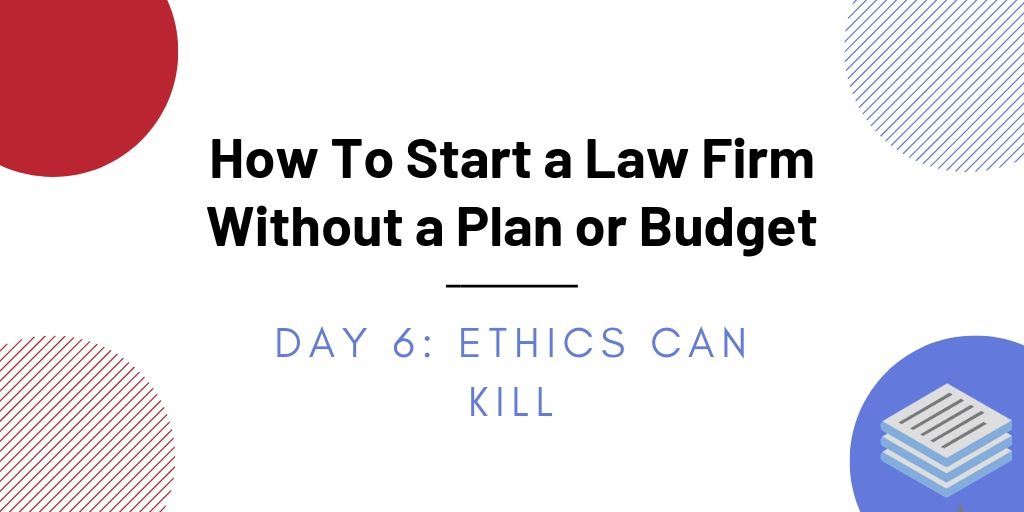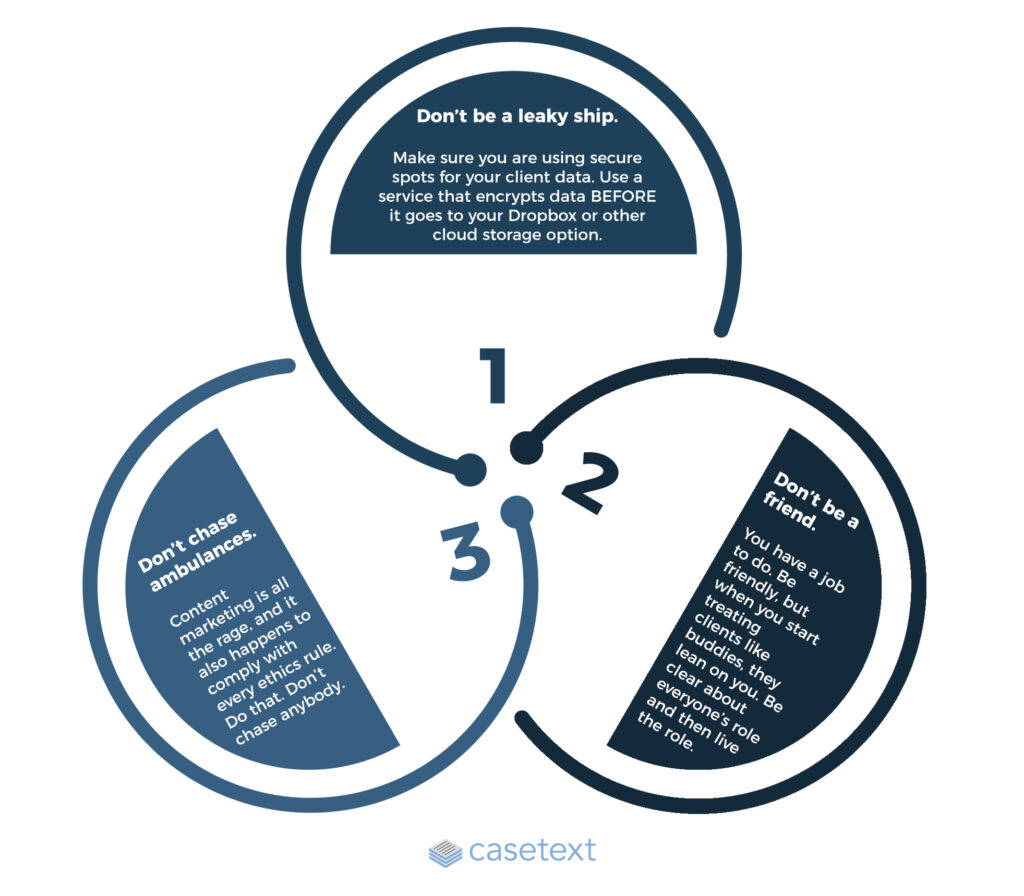
Yesterday we talked a bit about managing your tasks. Today we’ll talk about how to do that in a way that doesn’t get you in trouble.
I have two observations about ethics issues in the life of the new attorney: 1. This scares the hair off of most young lawyers; and, 2. This is about the easiest thing to solve.
Pick up your local bar journal. Look in the back in the section that publicizes which lawyers were disciplined by the bar, and for what. Are you noticing a pattern?
Those people are often way off the rails.
When that’s not the issue, the second most common cause is even easier to solve. A few lawyers get in trouble not because they are extreme deviations, but because they are disorganized.
There’s a perception about lawyers that we just chase ambulances and try to steal from the ignorant Everyman. I think that’s nonsense, but state bars try really hard to avoid the appearance of evil. Which means some of the rules impact good people. But for the most part, if you are reasonably diligent and have good systems, you’ll be okay.
So how do you avoid the problems? Make deliriously happy clients.
Most ethics systems are driven by complaints, meaning someone has to be upset enough to call the state bar about you. Happy clients don’t do that.
Clients that you ignore sue you, or clients who have skewed expectations. You also shouldn’t have inappropriate relationships with clients, but if you’re diligent enough about your practice to read this post, I doubt that’ll be an issue.
Know how to fix clients’ most common issues? Talk to them a lot, set clear expectations from the outset, don’t take on people you can’t make happy, and keep it professional. Easy, right?
Probably the greatest tool for avoiding ethics issues is the initial consult. How do you qualify your client? You figured out a few days ago what you offered, and why you do what you do — does this person fit in with that?
If you have a hard time kicking out good business, let them decide. Tell them who you are. Give them some paperwork that explains your “why” and see if it resonates with them. Be clear in your pricing and your communications policy. And promise no outcome, but tell them you’ll tell their story better than anyone else can. Then deliver. They will never sue you.
So make clients happy and keep your nose clean. Those often go together.
There you have it: the crucial three rules for ethics compliance. Obviously, ethics compliance is an entire practice area. Nerdy lawyers labor over these rules to find every nuance. But, and this is the most important thing to remember, clients don’t. And clients are the ones that sue.

In rare instances, someone other than a client could report you. Spend time over your career getting to know the rules you might be violating by accident. But make happy clients and I promise you’ll avoid 95% of the issues out there.
The other 5% rarely make the bar journal.
It’s time to decide how you intend to serve your clients.
You’ll work on processes for gathering data, filing paperwork, and preparing for hearings later. Right now I’m talking about how you will make your clients feel. What emotional exchange rate do you expect for your wages?
I practiced family law so this was no small thing. A mentor once told me never to practice in an area that means clients crying in my office, and you may follow that guidance better than I did. But even you need to think about this emotional exchange rate.
I’ll give you the short version: if you mean to be the high service, constantly available, therapist/attorney then you’d better charge handsomely for it. Those lawyers exist and they do quite well. Providing that service without compensation is the kiss of death for your business and your sanity.
You’ve identified your “why” already, so you’re halfway there. My firm existed to educate our clients, so, when a client felt confused, you’d better believe we jumped to teach them.
But we didn’t exist to comfort. That wasn’t our “hot dog.” We empowered through teaching, and we expected our clients to comfort themselves by making good decisions and seeking appropriate support. We knew our “why” so we could easily define our emotional exchange rate.
What does your “why” teach you about this issue? Think about it now, and stay true to yourself. Otherwise your firm will drown in work it’s not supposed to do, and you’ll ignore the whole reason you show up in the morning. Don’t do that.
You’ve done a lot of work to define who you will be as a lawyer. Excellent, but you are only half of the representation equation. It’s time to paint a picture of your ideal client.
Business consultants today call this “defining your avatar.” The term “avatar” came from Sanskrit (by way of gaming) and means “incarnation.” This is the virtual form of a real person, your design for the client you want to find over and over again.
So who is your ideal client? Man or woman? 35 for 45? Wealthy or middle class? Be specific.
Where does your avatar buy clothes? Does your avatar have children? Or pets? Or a house?
Is your avatar a hippie or a hipster, a ninja or a nerd, a poem-writer or a pipe-welder? All of these data points matter when you start marketing.
At one point, our ideal customer was “Someone who could pay us.” Nice.
Imagine trying to market to that person. Say I want to put up a Facebook ad and need to pick what interests to target. What band does “Someone” listen to? What are his/her favorite stores? Which Adam Sandler movie would “Someone” laugh at and which would drive him/her nuts?
Or imagine trying to write to that person. Does “Someone” like a casual writing style or a professional style? Would s/he prefer a book about arguing or gardening? I have to create all this content to attract “Someone” and I have no idea what to write.
Without knowing what fish you’re trying to catch, you have no idea what bait to use.
So we decided to sketch out our avatar. She was a suburban mom in her late 30s who has a college degree and has been out of the job market for a while. She’s smart and capable, a savvy buyer and an organized homemaker. She drives a minivan and shops at Nordstrom (when there’s a sale). And I knew we can find her and help her find our firm.
Take time today to define your avatar. This will help you so much as you develop your product and define your strategies.
Name your avatar. Susie, maybe. Seriously.
Go on to the next chapter: Do What An Owner Does
Or, go back to the Table of Contents
Rapidly draft common legal letters and emails.
How this skill works
Specify the recipient, topic, and tone of the correspondence you want.
CoCounsel will produce a draft.
Chat back and forth with CoCounsel to edit the draft.
Get answers to your research questions, with explanations and supporting sources.
How this skill works
Enter a question or issue, along with relevant facts such as jurisdiction, area of law, etc.
CoCounsel will retrieve relevant legal resources and provide an answer with explanation and supporting sources.
Behind the scenes, Conduct Research generates multiple queries using keyword search, terms and connectors, boolean, and Parallel Search to identify the on-point case law, statutes, and regulations, reads and analyzes the search results, and outputs a summary of its findings (i.e. an answer to the question), along with the supporting sources and applicable excerpts.
Get answers to your research questions, with explanations and supporting sources.
How this skill works
Enter a question or issue, along with relevant facts such as jurisdiction, area of law, etc.
CoCounsel will retrieve relevant legal resources and provide an answer with explanation and supporting sources.
Behind the scenes, Conduct Research generates multiple queries using keyword search, terms and connectors, boolean, and Parallel Search to identify the on-point case law, statutes, and regulations, reads and analyzes the search results, and outputs a summary of its findings (i.e. an answer to the question), along with the supporting sources and applicable excerpts.
Get a thorough deposition outline in no time, just by describing the deponent and what’s at issue.
How this skill works
Describe the deponent and what’s at issue in the case, and CoCounsel identifies multiple highly relevant topics to address in the deposition and drafts questions for each topic.
Refine topics by including specific areas of interest and get a thorough deposition outline.
Ask questions of contracts that are analyzed in a line-by-line review
How this skill works
Allows the user to upload a set of contracts and a set of questions
This skill will provide an answer to those questions for each contract, or, if the question is not relevant to the contract, provide that information as well
Upload up to 10 contracts at once
Ask up to 10 questions of each contract
Relevant results will hyperlink to identified passages in the corresponding contract
Get a list of all parts of a set of contracts that don’t comply with a set of policies.
How this skill works
Upload a set of contracts and then describe a policy or set of policies that the contracts should comply with, e.g. "contracts must contain a right to injunctive relief, not merely the right to seek injunctive relief."
CoCounsel will review your contracts and identify any contractual clauses relevant to the policy or policies you specified.
If there is any conflict between a contractual clause and a policy you described, CoCounsel will recommend a revised clause that complies with the relevant policy. It will also identify the risks presented by a clause that does not conform to the policy you described.
Get an overview of any document in straightforward, everyday language.
How this skill works
Upload a document–e.g. a legal memorandum, judicial opinion, or contract.
CoCounsel will summarize the document using everyday terminology.
Find all instances of relevant information in a database of documents.
How this skill works
Select a database and describe what you're looking for in detail, such as templates and precedents to use as a starting point for drafting documents, or specific clauses and provisions you'd like to include in new documents you're working on.
CoCounsel identifies and delivers every instance of what you're searching for, citing sources in the database for each instance.
Behind the scenes, CoCounsel generates multiple queries using keyword search, terms and connectors, boolean, and Parallel Search to identifiy the on-point passages from every document in the database, reads and analyzes the search results, and outputs a summary of its findings (i.e. an answer to the question), citing applicable excerpts in specific documents.
Get a list of all parts of a set of contracts that don’t comply with a set of policies.
Ask questions of contracts that are analyzed in a line-by-line review
Get a thorough deposition outline by describing the deponent and what’s at issue.
Get answers to your research questions, with explanations and supporting sources.